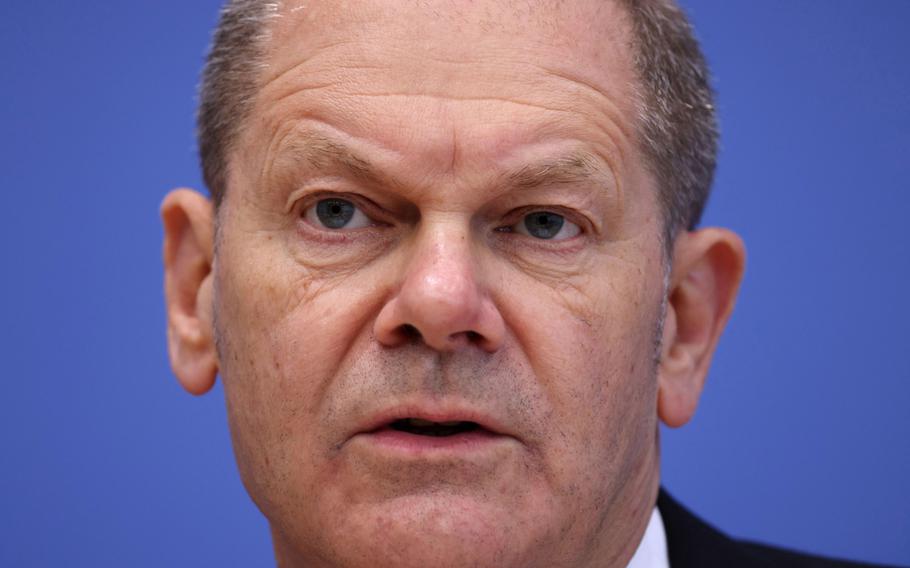
German Chancellor Olaf Scholz attends a briefing in Berlin on May 12, 2021. In an interview published Friday, April 22, Scholz said, “I will do everything to avoid an escalation that could lead to World War III - there can be no nuclear war.” (Liesa Johannssen-Koppitz/Bloomberg)
German Chancellor Olaf Scholz pledged to continue shipping weaponry to Ukraine, though insisted that he aimed to avoid an open conflict with Russia that could lead to nuclear war.
Scholz has come under intense pressure to increase military support to Ukraine, including sending heavy weapons such as tanks, and expand European Union sanctions against Russia to include oil and natural gas imports.
"We need to do everything to avoid a direct military confrontation between NATO and a heavily armed superpower such as Russia, a nuclear power," Scholz told Der Spiegel magazine in an interview published Friday. "I will do everything to avoid an escalation that could lead to World War III - there can be no nuclear war."
Scholz reinforced his rejection of an immediate EU gas embargo, saying such a move wouldn't end the war in Ukraine -- and would instead trigger a "dramatic economic crisis" in Europe, leading to the loss of millions of jobs.
Economists are at odds over the severity of the impact. The Bundesbank estimates that the German economy is at risk of shrinking nearly 2% this year if an embargo on Russian coal, oil and gas leads to restrictions on power providers and industry.
A joint forecast by the country's leading economic institutes projected the total damage of a sudden loss in Russian energy supplies at 220 billion euros ($240 billion), or about 6.5% of national output.
Risks are high that Russia's escalation of attacks on Ukraine will trigger aggravated sanctions and counter-sanctions. A complete ban on energy would have the biggest impact.
Scholz pushed back against the assertion that Germany was doing too little to support Ukraine in its defense against Russia. He added that Germany was in talks with the Slovenian government over a deal in which the Balkan nation would send Soviet-era military equipment, such as tanks, to Ukraine and in exchange for more modern hardware from German industry.
"We're supplying weapons and many of our allies are doing the same. This is not about fear, rather about political responsibility," Scholz said. "Avoiding an escalation involving NATO is the highest priority for me. So I'm not peering over at polls or allow myself to be irritated by shrill calls."
The chancellor called on President Vladimir Putin to stop the attacks and pull back Russian troops from occupied territory in Ukraine.
"There must be a peace agreement that will allow Ukraine to defend itself in the future," he said. "We will equip them in such a way that their security is ensured -- and we're available to guarantee that. There will be no dictated peace of the kind that Putin had long dreamed of."
He insisted that sanctions will remain in place at least until there's a deal between Russia and Ukraine. "A cold peace that isn't sealed with an agreement will not free Russia from the sanctions regime," he said.
Speaking to reporters in Vilnius, Foreign Minister Annalena Baerbock said Germany and its EU allies were working together on a phased-in import ban for Russian oil, but this won't happen overnight.
She pushed back against the assertion that it was mainly Germany holding up measures targeting Russian energy, saying nearly all other EU member states were also opposed to an immediate import ban for oil and natural gas because of concerns about the impact on consumers.
The bloc's import ban for Russian coal, which is being phased in over four months, was a first step in the EU's plan for a complete and irreversible exit from Russian energy, Baerbock said.
"That's why we have a plan to phase out oil by the end of the year at the latest -- together with all European countries," she said. "If we take this step now to make ourselves independent of Russian fossil imports, then this step must be for good."